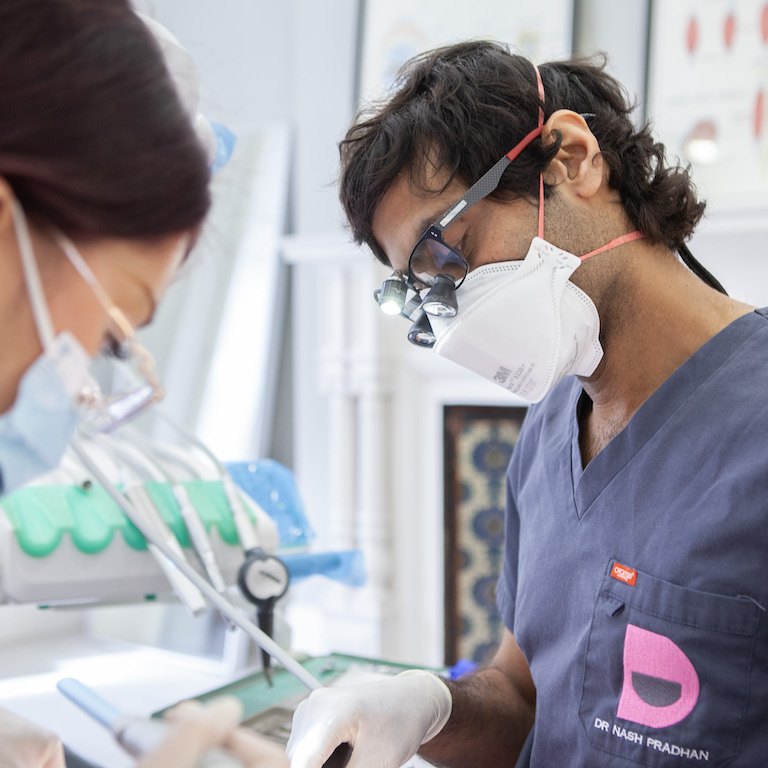Gum Therapy
The simplest form of gum disease, gingivitis, is often a reaction to a build up of plaque on the teeth. Bacterial plaque, a sticky, colourless film, constantly forms on our teeth. When it’s not properly removed by brushing, flossing and professional cleaning, it hardens into a rough deposit called calculus, or tartar.
What is gum disease?
The earliest sign of disease is bleeding of the gums. They may also look red or swollen. Gingivitis can often be cured simply with good oral hygiene, brushing twice a day and using other mouth hygiene aids, such as floss and a medicated mouthwash, as advised by your dentist or hygienist. Occasionally, even in an healthy mouths, gums may become infected or sore and you may notice an unpleasant metallic taste. This is acute gingivitis and you should seek urgent treatment.As the disease progresses the tissues holding teeth in place start to break down and pockets in the gum form around the teeth which allows even more plaque to gather. This stage is called chronic periodontitis. It is usually painless and can become quite severe if not treated resulting in teeth becoming loose, appearing to move position or to fall out.
If you have any further questions please ask a member of the team and we will be more than happy to answer any of your queries.
Frequently asked questions
What symptoms should you to watch out for?
Gums that have come away from teeth pus between the teeth and gums
Persistent bad breath or a bad taste
Permanent teeth that are loose or are changing position.
Scaling and polishing by a dentist or hygienist can remove tartar and stains. This will help you to keep your mouth clean.In more severe cases of gum disease, deep cleaning below the gum line by a dentist or hygienist may be necessary. Occasionally surgery is required in which the gum is reshaped under local anaesthetic, to allow affected areas to be treated.If gum disease has progressed too far, the tooth or teeth involved may have to be removed.
What does periodontal treatment involve?
In the earlier stages of gum disease, the treatment involves scaling and root planing, which is removing plaque and calculus in the pockets around the tooth and smoothing the root surfaces. In most cases of early gum disease, scaling and root planing combined with proper daily cleaning are all that are required to bring gums back to health.More advanced cases may require surgical treatment to remove calculus from deep pockets around the teeth, shrink the pockets, smooth the root surfaces and re-arrange gum tissue to make it easier to keep clean.
How much will the treatment cost?
The cost of the periodontal treatment will vary depending upon your needs. After your dentist has examined you and determined the appropriate treatment, they can provide you with an estimate of the cost. Keep in mind that treating gum disease is less costly, and better for your health, than replacing teeth lost due to untreated gum disease.
Who gets gum disease?
Gum disease can start when you are a child, but chronic periodontitis is normally only a problem in adults.Some people are more likely to have periodontal disease than others:
Crooked teeth are more difficult to keep clean, so the gums supporting such teeth might be more prone to gum disease.
Smoking makes gum disease considerably worse. It is very important for your general and mouth health that you stop smoking.
Certain drugs and medicines can affect your gums: ask your dentist about these. Diabetes and some other diseases reduce people’s resistance to gum disease. People who have these conditions need to be especially careful about their oral hygiene.
Existing gum disease can be worsened by hormonal changes, due to pregnancy or oral contraceptives. Here again, good oral hygiene is important.
Eating a healthy diet with plenty of fruits and vegetables helps resist gum diseases.
What will my dentist do?
Depending on which type of disease you have, your dentist will advise you of what the best course of treatment is. The treatments will be discussed in full prior to gaining your consent to continue. In most cases you will be treated by the dentist or hygienist, however, in more severe cases you may be referred to a periodontist.

